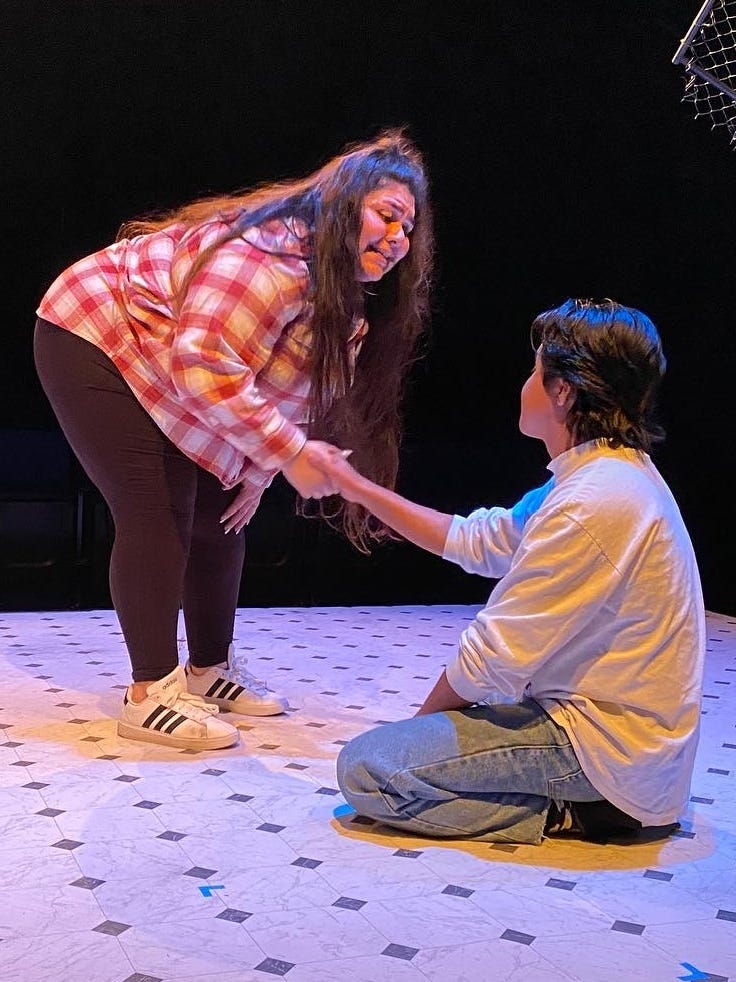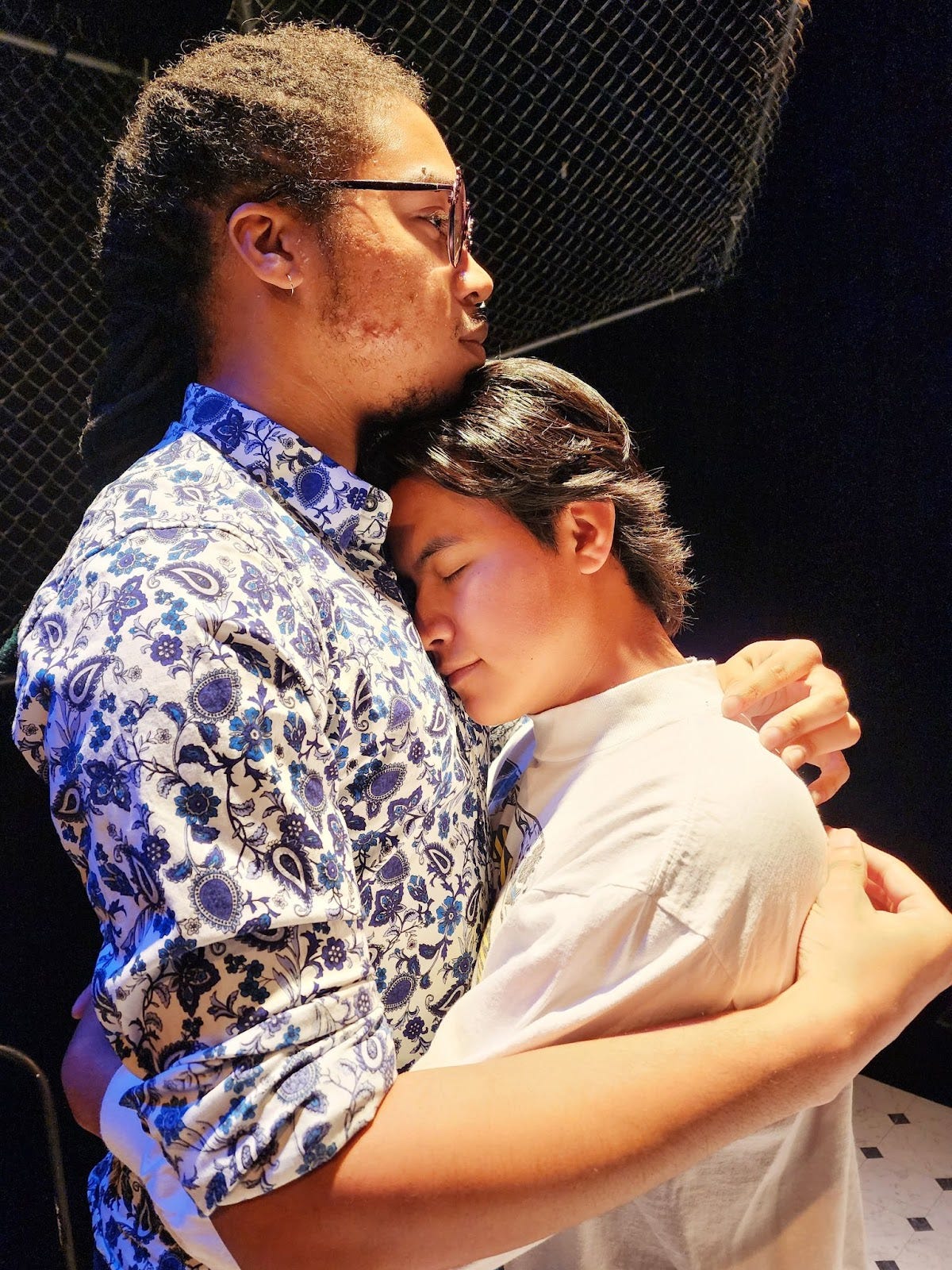Stage: Three Bone Theatre Presents Sanctuary City
A story about immigration and the American Dream you need to see
It was a place I was. I’m from here.
Even though I was born in… I’m from here.
Wherever I end up endin up,
I have gotten there from this place. Here.
Three Bone Theatre’s 11th season, entitled “The Hunt For The American Dream”, will explore what it means to be American. It kicks off with Sanctuary City by Martyna Majok, presented on an empty thrust stage with kitchen floors against a backdrop of floating chain link fencing. With only three actors and almost no scenery, Sanctuary City brings us into the drama of a real world with honest, fully realized characters. This is a story we need to see.
Described simply, Sanctuary City is about immigration in the United States. The audience looks into a personal space, however, where we witness an intimate story about how relationships bend and break under inhuman circumstances. Our characters are two undocumented Latine teens, named only B and G, played by Gus Zamudio and Isabel Gonzalez. Their immigration status hangs over them like a cloud as they juggle high school, jobs, and the difficulties of living in broken households. As their luck and circumstances diverge, the sanctuary they found in one another is threatened.
The first half of the play is an acting spectacle. Gonzalez and Zamudio switch seamlessly between moments in a blossoming friendship. Rapidfire changes show every time G thanks B for letting her crash at his apartment, every post-shift meal they share, every late-night discussion about parents, jobs, and whether or not to drop $70 to attend prom. The action bobs and weaves through time, connecting and reconnecting like a person trying to jog their memory. They move around the space constantly, reconfiguring their positions to tell each tiny story. This exercise in blocking and dialog would be a test for any seasoned actor, and this duo pulls it off with ease. On the linoleum floor of the spare stage, they build a visible world in our imaginations with the patchwork fragments of their characters’ history.
Zamudio, sweet, patient, measured, and Gonzalez, open, kind, exuberant, are so believable in their dynamic it feels like you have met them together before. The friendship they build is one underrepresented in stage and film, a ride-or-die bond between high school besties whose love for one another makes them family. The balance of energy and mutual affection between B & G is honest, and the growing belief the audience has in their bond is a testament to the work of playwright and performers alike.
G gains citizenship through her mother’s efforts, and before long we see the teens concoct a marriage plot to help B gain his. It will take more than five years to pull off, and they risk much if they see it through. But, as G goes off to college in Boston and B remains stuck in New Jersey restaurant jobs, the strength of their friendship is tested. G sees a life unfolding in front of her she is less and less willing to sacrifice. B begins a romantic relationship with Henry (Grant Cunningham), jeopardizing the whole plan. The play reminds us that the characters were still just kids when they planned to marry for freedom.
Cunningham is authoritative and incisive as law student Henry. Loving and fiercely protective, he can provide the safe space we know B needs to thrive, if he could only become a citizen. For B, a marriage to G provides safety, but none of the deep love we have all come to associate with life partnership. A marriage to Henry would give B the emotional fulfillment he wants most, but in 2006 United States gay marriage is still against the law.
The second half of the play lasts a single evening with all three characters hashing out questions of loyalty, duty, and responsibility. Each character takes the others to task for their mistakes, but we see no one take accountability for themselves. It is a display of the damaging power of unchecked, raw emotion in the fight-or-flight space we retreat to when trust fails. Without forgiveness, it does not seem that the bonds we have believed in can hold. By the time conflict comes to a head, the audience cannot help but be deeply invested.
The betrayals we see play out before us are relatable rather than damning, and there is no villain here. Each character is in a trap because of who they are, and what they have or have not accomplished in spite of the odds against them. Gonzalez, Zamudio, and Cunningham are challenged to move through modes of anger, sorrow, affection, and supplication almost as rapidly as the scene changes of the first act. They rise to the occasion admirably, but it is heavy lifting. Regrettably, the pace is too quick to justify the most dramatic exchanges, and the audience is left to fill in the missing moments.
We still root for everyone onstage, and we feel their indignation acutely. That these characters are forced into animosity is the toughest pill to swallow. Without the intolerance institutionalized in American laws, perhaps we would instead see three friends sharing a bottle of wine together in a city apartment, G and Henry deepening their connection through their shared affection for B. But in reality, the lives they would lead are deemed illegal by the nation in which they would lead them. They cannot be their unfettered selves at the most pivotal time in their lives, and it demolishes them.
Sanctuary City is at Three Bone Theatre
The Arts Factory at West End Studios 1545 W Trade St
Friday 8:00 Nov 11
Saturday 8:00 Nov 12
Sunday 2:00 Nov 13
Wednesday 8:00 Nov 16
Thursday 8:00 Nov 17
Friday 8:00 Nov 18
Saturday 8:00 Nov 19
Sunday 2:00 Nov 20
Jack Beagles and Blue Blaze Brewing are both three minutes from the theater, and great options for drinks before or after the show.




